Valpolicella is known for Amarone and muscular, powerful wines. Musella offers a counterpoint to that style with wines of elegance and a philosophy that emphasizes a connection to the land. Musella is also a place of great natural beauty full of biodiversity where vines share the landscape with forests, animals, and water features such as lakes and streams. While the approach is far from traditional, the wines are excellent and can be appreciated by those in the natural wine scene as well as more conventional wine drinkers. Winemaker Maddalena Pasqua di Bisceglie and her family have owned the estate since 1995.
The commitment to natural methods is impressive. Cover crops are used extensively and the estate purchases cow manure from a local farmer, who also supplies milk which is used as a spray to combat down and powdery mildew. Additionally they have recreated a local custom which was to plant cherry trees in the vines. This encourages birds who can find more worms and insects.
Grape Collective talked to Maddalena Pasqua di Bisceglie about her natural approach to winemaking, some unusual methods such as placing speakers in the vineyards to play music to the vines, and the magical dragon which lives amongst them in the forest.
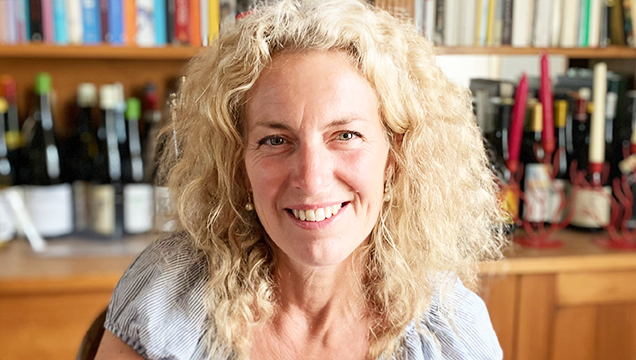 Maddelena, so just tell us a little bit about the history of Musella.
Maddelena, so just tell us a little bit about the history of Musella.
Maddalena Pasqua di Bisceglie: Musella is an estate, it's in sort of a national park, even if it's private, we preserve it. And it's pretty unusual for us in Italy to have such a big piece of land so properly natural. I mean, it's protected by law in the sense you cannot cultivate more than what we do. You cannot hunt in it. You cannot build anything. So it's historically and naturally protected by law, by ourselves too, because we are so proud to live here and in this environment, in this condition, that of course we do our best to keep in good shape Musella.
Musella has been this kind of estate for a long time, because it was originally a property for noble people established here in the 15th century where they had the summer house. And then they developed different houses like the place where I live here, it was actually for the guys dedicated to the hunting. And so we have these houses around for workers for the noble people. And between one piece of forest and one vineyard, we have this situation of roads, little lakes, villas and sometimes vineyards.
Maddelena talk about the terroir in Valpolicella.
Our terroir is very specific in Valpolicella because talking about a bit of background, we live in a place that came out immersive from the sea 45, 44 million years ago. And so mostly our soil is presented by strong calcareous soil. Calcar that is at the bottom of the sea compressed for many, many millions of years, immersed and created this condition of calcar that we can find mostly in all of Valpolicella. There is a part where we can find volcanic situations, so more basaltic soil, and this is creating the fantastic condition of Valpolicella, there's a very mixed soil.
And in my opinion, it will be very important in the future because at the moment we still are a bit slow in this consideration, because Valpolicella could really be the Burgundy of Italy, considering every little spot. Any calcar is different. I have more rolling stones calcar, but my neighbor is already having a different situation of calcar, more layers of different stones of calcar. So in this way, it is completely different than what I have, even if I have a few 100 meters of distance. So this is the part of the magic soil in Italy that in a few 100 meters, you have a completely different situation or interpretation of a different situation. Particularly in my place, we have calcar, this rolling stone calc, very strong or intense. On the top of this, we have this red clay. Red clay you have to imagine a tennis court, very red, very intense and full of iron. And this situation is pretty unique in Valpolicella. And this has stimulated me to play in pureness, to understand how Corvina behaves in this condition versus other conditions.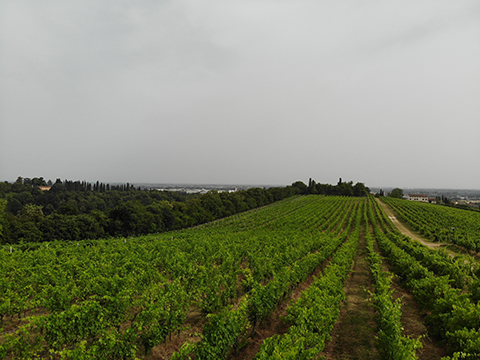 So I also engage some friends of mine, some other colleagues doing the same in different soil conditions to see all the possibilities of Corvina here in Valpolicella. It definitely is a very stimulating place for agriculture in general.
So I also engage some friends of mine, some other colleagues doing the same in different soil conditions to see all the possibilities of Corvina here in Valpolicella. It definitely is a very stimulating place for agriculture in general.
And talk about your philosophy of viticulture, because you've been a real champion of biodynamics and organic practices for a very long time now.
My practice is definitely biodynamics because I needed to do that. And I think this place deserves it, every place deserves it, but I had the luck to have it in my heart quite earlier with respect to what my father did for example, with considering the agriculture. So for me, I need to do that. It was not a choice. I really need to do that because I felt living in this place, I live in the middle of the vineyard, you have the perception of everything happens here. So you have the perception of the happiness or not happiness, of the divine, so the plants or the trees, biodynamics is one of the ways to get into this sensation, it's not the only way, but to be in connection with what you have around, it stimulates the observation, stimulates the respect. It even stimulates modesty, because sometimes you think to get to the final point and you understood everything and something happened and you put yourself down to the beginning because you have to ask and ask every time, you think there is nothing you can know.
The sense of humor of nature is unbelievable because there are so many different aspects. There's so many variabilities that you have to be there to touch, with open eyes, open ears, and very modestly to learn that every single detail, every single day, every single season is so different. It's not mechanical. You need to live it.
It's like in a human relationship. You get to love a relationship. You don't know everything about that person. You just simply start to live with and to know it. And the same thing with animals, or vines or fruit or vegetables, whatever it is, you have to learn every day from this. So of course, biodynamics is one of the ways I got to find this kind of connection of respect and mutual knowledge.
And that also is very good, biodynamics, when you have a big land. Biodynamics is good if you have a vegetable garden of one, two square meters, or if you have an Australian property of thousands of hectares. So that's very versatile and good.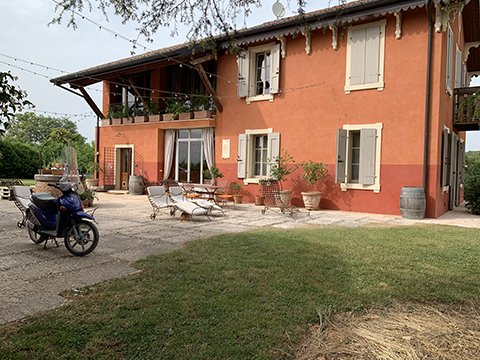 More than all the philosophy, biodynamics is in my opinion a practical method, too. All the philosophy behind the cosmic side, the things behind that you can learn them all, you can go deeper into that during the winter, but during the vegetable season, you have to operate in a practical way and think just what you can have from the practical application of that method.
More than all the philosophy, biodynamics is in my opinion a practical method, too. All the philosophy behind the cosmic side, the things behind that you can learn them all, you can go deeper into that during the winter, but during the vegetable season, you have to operate in a practical way and think just what you can have from the practical application of that method.
Talk about what biodynamic actually means in terms of the farming.
Biodynamics is this specific type of farming when you take care of soil, Mother Earth. Mother Earth is the most important. And you have to have in mind the consideration that everything is about living beings. Everything is a living being like us and so we have to respect this. Mother Earth, at the beginning because it's the mother, so we have to guarantee to give air to the soil, practically. Practically means to plow, to crush the soil in the way that it can give a lot of air to the soil to guarantee life, microorganisms, bacteria, worms, whatever, can keep the soil alive. And this is the first step.
And let's say that I spend 60% of my time doing this, to take care, to be sure that Mother Earth has enough air to guarantee life to everybody. Then automatically it happens that they are able to keep the water so the soil is always wet. We never irrigate anymore. At the beginning, it looks like a miracle, but then it happens, it's true. And then you understand very well why. And then of course, this conditioned air and water create the humus, that is only filled with good.
We don't give, Mother Earth gives to its vines. So we create the conditions to the earth to produce the humus. Of course, I mean, we need to do it because we ask the Mother Earth to cultivate thousands of vines only in a small piece of land. And so to compensate this request, we play biodynamics in order to let Mother Earth do its own job that it normally does in a natural condition. So this is biodynamics. It's compensation to let Mother Earth regenerate as it normally does in normal conditions.
So biodynamics has two parts. There's the farming part and then there's a spiritual part. Talk about the spiritual part of biodynamics.
The spiritual part is the part that is connected to the human beings. When a human being is able to be connected back with nature. The spiritual part of biodynamics is when a human being is able to be back in their connection with nature. That was absolutely normal and natural in the past when the people were looking to the stars, following the seasons. And now we have to call it spiritual because we have to be back to some sensation, some way to live to interpret life.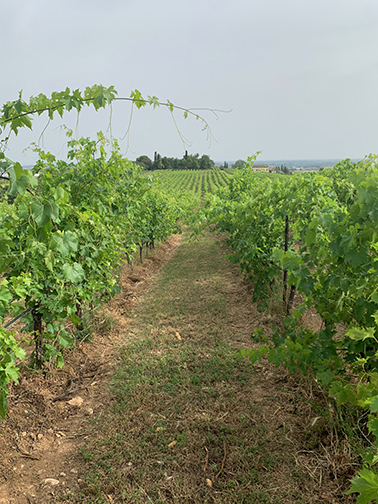 And again, it's easier for me that I live in the middle of the forest in the vineyards to get to this point. Of course, I was born with this natural tendency, but it's more difficult for people in business, who live in the city with a lot of hurrying, involved with different kinds of stuff to have this sensation. I recommend people to go more on vacation to enjoy nature in this sense.
And again, it's easier for me that I live in the middle of the forest in the vineyards to get to this point. Of course, I was born with this natural tendency, but it's more difficult for people in business, who live in the city with a lot of hurrying, involved with different kinds of stuff to have this sensation. I recommend people to go more on vacation to enjoy nature in this sense.
But what I want to say mostly is the consideration of, we talk about Mother Earth, but mother has a father too, that is the sun. Because nothing can happen without the sun. Not the sun specifically, but the warmth. The warmth of the sun is what is really generating, really giving the start, the strength, the origin of the movement, because Mother Earth is arming you, is welcoming you, is feeding you, but it is the Father Sun that is giving you the impulse to grow, to start, to go on. It's moving the water to the top, this warmth, and these forces are creating what we call life. What is germination, what is leaves, is green and development, this is so important in the consideration.
In fact, the most important preparation we are playing with, the one that is related to the earth, the 500. And one is related to the sun, the 501. There's a crystal replaying the sunlight in such a way that it is multiplying the effect of the sun on the leaves. And it's giving an impulse of growing, to grow up and the power, the strength. And altogether the managing of the water for the earth and the managing of the sun and the warmth for the sun creates what we have. And we can find it in the glass or in a salad or in a tomato or whatever. In the animals, how they look, how they behave, how they move, and the hair, how they are, and of course in ourselves.
So Maddelena, you live in this very bucolic, very beautiful part of the world. You have pigs, you have a forest, there's a lot of nature that surrounds your vineyard.
Musella is lucky because it's already a park in ways where we can find a lot of forest, natural animals, like deer, wild boar, foxes. Of course, I have increased the animal presence with my sheep, my donkeys. The sheep are taking care of the grass and the vines and the donkeys are taking care of the bushes around the vines to create more air. Of course, the chickens. Of course, the dogs and the pigs.
The pigs are keeping clean the forest too and are very good for Christmas dinner. And it's important to have animals, not just for the manure, and of course, it's important also to get used to staying in touch with nature, because almost every day, you have some issue with animals. It's important because it keeps you very close to what is going on in the forest, with the food, conditions, you understand all people in the past how they were experts in that.
So we are looking often, at what people did in the past because it's so important. They already did this experience, that we are slowly lost in this era, making everything very mechanical or easy for the human beings and not for animals. In the last decades people took care more, it was easier for human beings, so for production. Taking a part the consideration of animals like human beings, not just like a thing. And so it was important in such a place like mine to look back at the consideration of every animal, like a part of a general living being. This is the reason why I'm keeping the animals, even if it's pretty challenging sometimes, but it's so incredibly rich, it will make you richer inside really.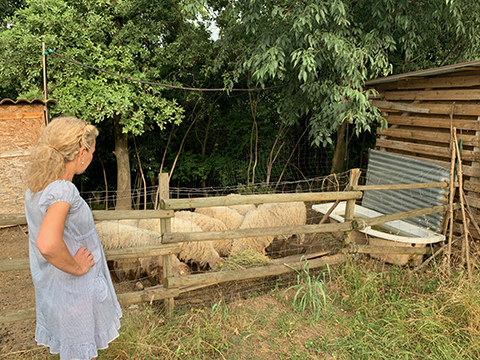 And talk about some of the specific wines that you make.
And talk about some of the specific wines that you make.
And in this place, we have the luck to produce something very local like Valpolicella Superiore. Actually it's one of my favorites. And it's one of my favorites because it's the purist. I like to play with pureness. And so the only ingredient in all my wines is grapes and grapes only. There isn't anything else. Even with the oak now we are playing it very light because we don't use toasted oak anymore, but just we bend by warmth or steam in order to avoid any kind of ingredients.
We also play with other material like we play with red marble, a stone from Verona, for the white. Cement to create a natural movement in all our wines. And so of course, we still remain in a very local production because Valpolicella is a Corvina. Corvinola, Rondinella, all the varieties are very typical from here, as is Ripasso, as is Amarone. Amarone, for more simpler. And then we do a Riserva. And then we do a special one following the moons and music. And then we do this Garganega, the percent that is the one staying in the marble tanks. And then we do a sparkling ancestral with the Chardonnay.
So we do a lot of experimenting. Also Pinot Bianco, pure without skin contact. And of course the grandpa, the grandpa Recioto that for us is still very important because it's the base of every red wine in Verona. So with a draining process of four months, the selection of the best bunches, the right place to dry it up, and the consideration of this wine that it is not just a dessert wine, but is also a very intense and aged wine, and is good for many, many different occasions.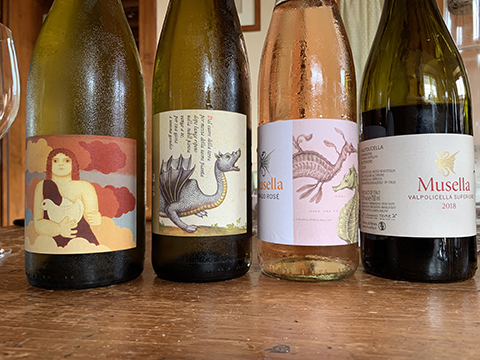 Maddelena talk about playing music in the vineyards.
Maddelena talk about playing music in the vineyards.
I decided to play music in the vineyards, it's always a part of the sensation. When you live inside and you have this sensation of... Music is nice. Music is a part of us. Music is something completely connected to nature, and is naturally existing. Look at the insects differently, the timing, it's music as well.
And one day I found a guy, I was listening to music from leaves, having a very stupid and simple machine you can find on the internet that is able to read, listen, the lymph of the plant passing into the leaves and translating in media, and then audio file. And so we listened to the different kinds of varieties with a simple machine. And every variety, in my case it was vines, but of course you can even listen to roses. Every variety has the same music, even changing the plant. The music of Corvina is the music of Corvina, that actually is the happiest. Then Corvinola is lower. Oseleta is very low, but intense. And so we play with that.
During the winter the music is more oriented on percussion in order to get deeper in the soil, to the roots. Because when it's winter the forces are not going up for the sun demand, but are going down to save themselves and to give more power to the earth and to be enriched by the substance during the winter. And so we give this music a sort of help, giving more rhythm in going down. And so it is mostly percussion.
During the springtime, we give them something more happy. And so we start with Vivaldi and Mozart because also they play in 432 megahertz and that is the frequency of nature, or even the heart, and so it's more happiness.
And then in the summertime, and this is my idea, more Pink Floyd, John Coltrane, because they played something in that 432 megahertz also. And I decided that it is quite nice.
We see also that the frequency of the leaves plays very well, they're happy. But then it's four years that I'm experimenting with this stuff and I saw that it's accelerating a bit too much, the life. It's not that bad because we started 15 days before pruning. So I reduced it from six hours per day to four hours per day. And I changed the music more often, because they could be tired, bored, always the same music everyday. And I always take into consideration they are living beings and so in some way they have something similar to us.
And this is my idea, just my crazy idea. So even if I see there is some difference, some effect, and I don't know if this is the right way, but I'm looking forward to discovering more things. Maybe in 10 years I will tell you something different.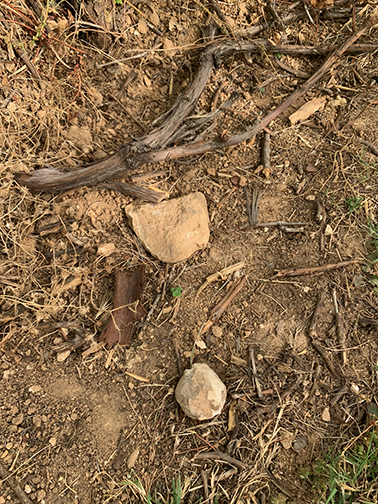 Talk about your philosophy of winemaking and your wood or cement usage and how that's evolved.
Talk about your philosophy of winemaking and your wood or cement usage and how that's evolved.
Our philosophy here is based on the full respect of the grapes, soil and weather conditions. And the only ingredients here are earth, grapes and sun. Me and my cousin Enrico, we are just the guardians, and with mother and father, we follow the process. So we make sure the process is going well. We take care, we give the best account for the possibility of the wine development, while we try to stay away from transformation. We don't want to put any of us or our ego into the wine production. Our choice is to make a wine as it is, as it is happening here with this soil, with these conditions, with these possibilities. So we really don't do too much.
So the idea of the red marble was born from this, to give comfort to the wine, after the picking, you then have the stress of fermenting. And then you finally put this stressor, the must juice, in a place that is going back to home, back home. Because red marble from Verona is actually calcar and red clay together compressed. This is exactly what we have here, where the vines grow, calcar and red clay.
So these tanks come in different shapes. We are studying a lot about shapes because the shapes are able to move the wine. When you move the different quantity in the same tank you're able to let the wine move itself for physics reasons. And this is massaging and filtering, and keeping this wine alive. Even the barrels, because even the barrels have a structure where you have different volumes. And this is able to maintain a movement in the wine. So we didn't discover anything, just simply the marble is connected to our soil and our development.
Cement is a compromise. In a way cement is not coming from a cement factory, it's coming from an artisanal production of stones and sands. So we have that kind of vibration. Even if it's working with the shapes you're able to keep alive every time. And of course the oak. Not toasted, bended with steam or wood and more delicately, because we really want to avoid anything that could put in second plan the grape development.
Speak a little to the way you're using sulfur. I thought that was very interesting in terms of the misting. And the fact that you're using natural yeasts and you don't add anything to the wine.
I'm very happy to say that we don't put any ingredients in the wine, even if they can ask, "No, but you put sulfates." No, I don't put sulfates anymore. I put sulfur. Sulfur from the cave, the yellow one. We have big, big bags of this powder of sulfur, it came in from the caves, that we spray in the vineyards when we need it for oidium. And we burn it with a system we learned from a colleague, to make in the big tank.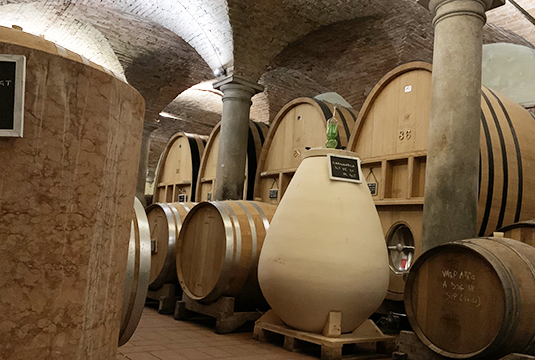 And so it's not sulfates coming from the factories that are very, very bad, but what we use is more gentle. And I want to do it, I'm happy to do it because this way I'm guaranteed that the people who are buying my wine in New York or in Australia or in South Africa are able to drink the same kind of quality I'm drinking here at home. Because the wine is very alive so it can suffer from the hot temperature, from the travel, as we do.
And so it's not sulfates coming from the factories that are very, very bad, but what we use is more gentle. And I want to do it, I'm happy to do it because this way I'm guaranteed that the people who are buying my wine in New York or in Australia or in South Africa are able to drink the same kind of quality I'm drinking here at home. Because the wine is very alive so it can suffer from the hot temperature, from the travel, as we do.
In this kind of way, with the sulfur burn and the gas, I'm able to give some protection to the wine in order to let it travel and to get to your table, even if you are in the opposite part of the world. So this is the only ingredient apart from the grapes that I put in it, I'm proud to put in it.
There is a big discussion about sulfates. In my opinion, it is a bit exaggerated because of course, sulfate that is from a factory is not good at all, but the quantity that people put into the wine is not that big to be dangerous, in respect to other products that we eat everyday that are definitely more full of sulfates. So we investigated this point more, it for sure inspired me, this factor, to be into the pure sulfur instead of sulfates. Because thanks to the critics or this discussion, I understood that the sulfates are coming from an oil refinery and definitely not good. And so we investigated, and we found this sulfur coming from caves is a different story, and not difficult to apply. And so it could be more extended generally.
And there are different styles of natural wine. You get natural wines that are kind of on the funky scale. You make wine in a very natural way, but your wines are very precise.
Watch a 360-degree video of Musella's vineyards on Youtube. This is best viewed on a mobile device (click the link here).
There are many different styles in natural wine. In natural wine production. It's even difficult now to explain to people because they are always asking me the difference. And the difference is more on the books than in practice, because if you do biodynamics or you... Biodynamics is a certain specific agricultural process. But if you don't put any pesticides or chemical stuff in the vineyards, then you don't do anything in the winery, it would be called natural. And this is the biggest problem, but the discussion is very long. But to make it short, often someone who started an oenologistic product was not an expert in wine production. They simply had this passion to do something pure without products.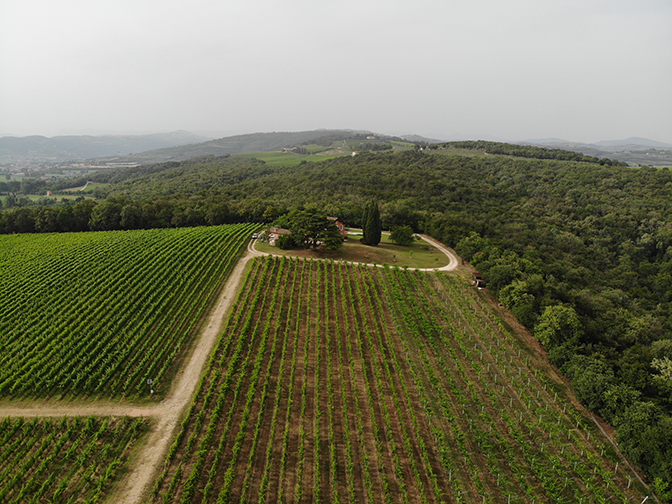 And so sometimes some people make mistakes and the wines are not that clean because maybe simply a loss of experience and nothing else. We do precise wine because my cousin Enrico is a very precise guy. And he never wastes time. He's never lazy. And even if he has to wake up at 3:00 in the morning he does. And we always have in mind that the wine has to be for everybody, natural non-natural, you have to drink something you are happy to drink and not, you say, "Okay, this is a bit dirty, but it's natural."
And so sometimes some people make mistakes and the wines are not that clean because maybe simply a loss of experience and nothing else. We do precise wine because my cousin Enrico is a very precise guy. And he never wastes time. He's never lazy. And even if he has to wake up at 3:00 in the morning he does. And we always have in mind that the wine has to be for everybody, natural non-natural, you have to drink something you are happy to drink and not, you say, "Okay, this is a bit dirty, but it's natural."
And so I accepted no, for us the wine is for everybody. You have not to ask if it's natural or not natural, you have to enjoy the glass, be happy that the day after with the digestion and the headache, and then maybe, "Yeah, okay. It's a natural wine." But as not to be a flag, the dirtiness is not to be a flag of natural. Because natural is good and natural is pure and it's clean. So whenever the natural is not clean, it's because maybe they need some experience more to understand how to avoid some problems, because not just us but a lot of peopl everyday are doing more clean wine.
So what's the symbolism of the dragon on your logo?
The dragon. We live in the mouth of the dragon. The place where we are is called mouth of the dragon. And it's because there is a real dragon living here. He is pretty shy. He is not coming out very often, but I know him very well. And he's actually having a challenge with the flying fish. Because the dragon represents for us a part of the name of this place and the connection we have with the dragon that is this magical and incredible animal protecting us in some way. And he's representing the fire and the earth versus the flying fish that is representing air and water. So the four elements are playing together and something we try to respect.
The reason why we put the dragon on the label is because there's a lot of power and a lot of energy in that. And the first place where my father put his foot was here, in the mouth of the dragon. So it's very significant for him, for us, in order to explain that he decided to change his life 30 years ago when he arrived in this place.
So you get the power of this place, you get the energy of this place. And it was so strong that he was able to really make a revolution in his life. And involve all his family, me included, even if I was a bit young and not for sure in the direction of the winemaking career. But he was able to involve me. This place was able to involve me. And of course the dragon did his own part to take all of us into this adventure that now is our life. And it's such an intense life. Such an intense life.
For more on Musella listen to Monty Waldin's interview with Maddalena Pasqua di Bisceglie on Soundcloud.














